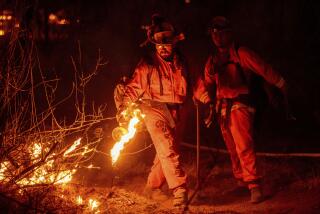Gore Proposes Rights for Victims of Crime
- Share via
MEMPHIS, Tenn. — Vice President Al Gore proposed a new federal law Tuesday to guarantee crime victims time off from work to attend their attackers’ trials as part of what he called a “victims’ bill of rights.”
Gore told audiences at a college and a police precinct house that he wants to strike a new balance in criminal law to give the victims of violent crime legal rights equal to those of defendants in criminal trials.
“It’s high time--indeed, long past time--to focus on the rights of victims,” he told a small audience of crime victims and victims’ advocates assembled to meet him at Rhodes College.
“The accused criminals have all kinds of rights, and we all understand why; that’s part of our system,” Gore said. “But here is the point: When those rights are enshrined in the constitution and the rights of the victims are not, whenever the two come into any kind of conflict, it’s not even a close contest; the victims are put in a back seat and sometimes completely ignored.
“Under my proposal, a victim of a crime will have the right to take time off work to attend the trial of his or her attacker without fear of losing a job or losing a promotion. After all, you’re legally required to go and serve on jury duty; well, if the trial is being conducted of your attacker, you ought to be able to go and attend.”
In Spirit of Family, Medical Leave Act
The vice president’s proposal sought to combine two Clinton administration themes that have long proved popular with voters: tough anti-crime measures and the 1993 Family and Medical Leave Act, which guaranteed workers the right to unpaid time off for family emergencies.
“You remember family and medical leave; he [Gore] supported extending that law to cover parent-teacher conferences and children’s mental health appointments,” said Gore spokesman Chris Lehane. “This is in the same spirit.”
Gore also renewed an earlier proposal he made for a constitutional amendment to guarantee victims the right to attend court proceedings, testify in sentencing hearings and be notified when their attackers are released.
Gore won support for his ideas from a panel of local Democratic officials, sheriffs and crime victims that was assembled to hear him speak.
“We shouldn’t even have to ask for it,” said Jodie Gaines Johnson, who was kidnapped by three men, held captive for five days and raped. “We’re not asking for more rights than the criminals.”
Johnson said she especially supported Gore’s proposal that victims be notified before their attackers are released from prison.
“Now my perpetrators, they’re starting to be paroled,” she said plaintively. “I have four kids. I don’t want to be in the grocery store and run into them--because I’m not that strong. It would just devastate me.”
Other audiences were not as positive. Sen. Jon Kyl (R-Ariz.), co-sponsor of a similar constitutional proposal that died in the Senate this year, dismissed Gore’s proposal, made during a campaign swing across Tennessee and Missouri, as “fraudulent.”
“He’s been AWOL from this fight,” Kyl said in a conference call with reporters that was organized at the behest of Republican presidential contender George W. Bush, who supports the Kyl legislation.
Lehane replied: “It’s unfortunate that Sen. Kyl is playing presidential politics here. If he were really interested in victims’ rights, he’d be supporting the Gore proposal instead of making these scorchy political points.”
The Kyl bill, co-sponsored with Sen. Dianne Feinstein (D-Calif.), died after the Clinton administration and others objected to some of its provisions. Administration officials said they objected partly because prosecutors wanted a guarantee that the presence of victims could not be used to derail a trial by delaying it.
Others who have criticized the idea of a constitutional amendment guaranteeing victims’ rights have ranged from senators in both parties who question whether an amendment is necessary, to the American Civil Liberties Union, which says the proposal would “compromise the constitution.”
Gore, who first made his proposal in May, said he has normally been “very reluctant to support constitutional amendments” but in this case “I feel very strongly about it.” He said he favors a constitutional amendment mainly to place victims’ rights on the same legal plane as defendants’ rights.
The vice president has not supported constitutional amendments on hate crimes or flag burning, aides said. Gore voted in favor of a proposed federal law to outlaw flag burning in 1989 but not a constitutional amendment.
They said Gore has not worked out the wording of his proposed constitutional amendment.
Congress is allowed to propose an amendment to the Constitution with a two-thirds vote of both chambers.
The difficult process, which has only been completed six times since 1933, then requires approval from three-fourths of the state legislatures.
Gore Lectures Police Officers
As part of its attempt to dramatize his interest in crime fighting, Gore’s campaign took him to the motorcycle garage of a police precinct house in an upper-middle-class section of Memphis. As two dozen police officers stood somewhat uncomfortably or leaned against their Kawasaki 1000 motorcycles, the vice president lectured them earnestly about his idea for a constitutional amendment.
At his Rhodes College appearance, Gore returned to one of his favorite themes of the last week: the increasing budget problems of Bush’s state government in Texas.
Trumpeting a report in the Houston Chronicle of a coming $600-million shortfall in Texas’ state Medicaid program, Gore said: “This apparently will worsen an already grave budget situation . . . , the worst in Texas for a long, long time.
“I don’t think it’s right to put Social Security at risk or to propose an approach to budgeting for the federal government that . . . would result in the same kind of elimination of the surplus that you’ve seen in Texas, but at the federal level.”
More to Read
Get the L.A. Times Politics newsletter
Deeply reported insights into legislation, politics and policy from Sacramento, Washington and beyond. In your inbox twice per week.
You may occasionally receive promotional content from the Los Angeles Times.











